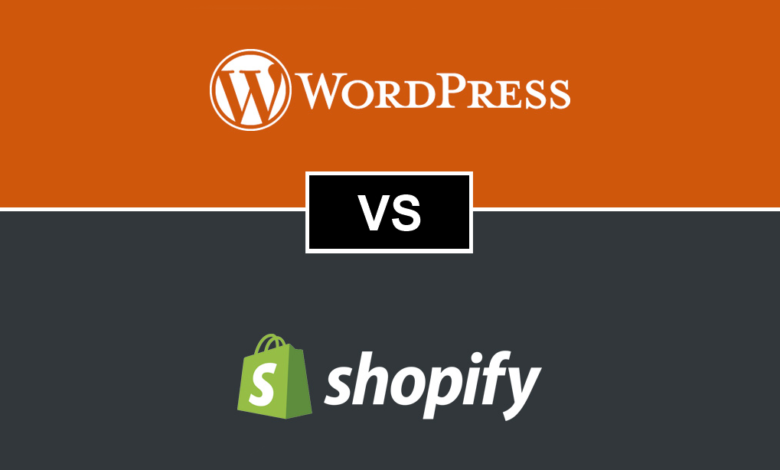
Are you thinking of creating an online store?
Choosing an eCommerce platform is the first step to make it a reality. Chances are you’ve come across WordPress and Shopify, two popular platform options. Both claim to be the best in an online store creation game.
If you’re wondering which one’s right for your eCommerce business idea, you came to the right palace. In this post, we’re comparing WordPress and Shopify, in a simple language.
We’re going to compare them by:
- eCommerce features
- SEO features
- Payment gateways and transaction fees
- Themes
- Plugins
- Cost.
1. WordPress vs. Shopify: eCommerce Features
An eCommerce website should have specific features to help you promote and sell. Product listings, discounts, shipping, inventory, cross-selling, payments, and marketing are some of the most important.
Both platforms provide both essential and advanced functionality. Still, Shopify has a slight advantage in this category. Here’s why.
Unlimited products, abandoned cart recovery, discounts, product sorting and gift cards – Shopify has all the essentials by default.
WordPress, on the other hand, doesn’t have any eCommerce features out-of-the-box. To create a store, you need an eCommerce plugin – WooCommerce, and others (depending on the features you’d like to have).
Still, WordPress wins this one. To move beyond basic features in Shopify, you need to pay for a new plan. With WordPress, it’s easy to find any eCommerce feature imaginable in the plugin store. So, no upgrades are required.
Keep in mind, though, that choosing a platform doesn’t mean you’re stuck with it forever. You can easily migrate WooCommerce to Shopify and back.
Winner: WordPress. It’s easier to upgrade an online store by adding plugins rather than paying for premium plans.
2. WordPress vs. Shopify: SEO Features
Both eCommerce platforms come with decent SEO capabilities.
Shopify has strong features and does many things for you (like creating XML sitemaps). With it, you can customize page URLs, meta titles & descriptions, and site structure.
WordPress offers the same in its editor. Besides, you can use WordPress SEO plugins for WooCommerce – Yoast is the best example – to enhance your site’s ability to rank. Plugins do many optimizations automatically, but you can ask someone with SEO certification for assistance.
Winner: Draw. Even though WordPress requires a bit more manual work, both are pretty equal in automation and optimization departments.
Read more: How to Pick a Good SEO Company
3. WordPress vs. Shopify: Payments and Transaction Fees
Both Shopify and WordPress offer over 100 payment gateways for merchants. This makes them a good option for stores in most countries.
As for the fees:
- WordPress: 2.9% + $0.30 for each transaction (there’s a 1% extra fee for non-US buyers)
- Shopify: no fees with Shopify Payments; Additional charges of 2%, 1% or 0.5% on Basic, Shopify, and Advanced Shopify plans.
So, Shopify has slightly higher fees for using non-Shopify standard payments.
Winner: WooCommerce. Both platforms have the same amount of payment getaways but WordPress’s transaction fees are slightly lower.
4. WordPress vs. Shopify: Themes
The Shopify store has 70 themes for eCommerce stores (only nine are free).
Each one is editable, meaning you can adjust colors, fonts, and add brand materials like a logo without coding. The collection overall is great quality-wise, but offers minimum editing capabilities.
As for WordPress, there are 1,100 + highly editable WooCommerce themes.
This gives merchants a lot of options to create a unique store. Many are made by third-party providers, which makes them different quality-wise.
For example, some might not be fully compatible with the latest WordPress updates. Besides, some third-party themes might have security flaws.
Winner: Draw. WordPress has more themes, but Shopify’s are more quality on average.
Read more: Top 10 WordPress Themes For Your Next Website
5. WordPress vs. Shopify: Plugins
Both eCommerce platforms have app stores for merchants.
WooCommerce’s store, however, comes with more options. There are over 3,200 apps for Shopify while the WordPress directory has 6,000+ WooCommerce plugins.
Still, such a difference doesn’t mean that WooCommerce wins here. The first reason is that both provide plugins a merchant needs to run a successful store.
For example, Shopify abandoned cart, shipping rate, one-click checkout, product reviews, and others make it easier to keep the shopping experience up to high standards.
The same is true for WooCommerce.
Need email marketing? Or WooCommerce product review plugin, maybe? The platform has plugins for everything you could possibly need to sell online.
The second reason why WooCommerce plugins have some WordPress plugins have some security issues. That’s why we decide it’s a draw in terms of plugins.
Winner: Draw. Both platforms have the plugins needed to build a successful store.
6. WordPress vs. Shopify: Cost
Shopify pricing starts at $29.90 per month but gives all basic features out-of-the-box. Affordable pricing is what attracts many new sellers, who can also go for more advanced plans. Here’s the full pricing for the main plans.
Keep in mind that Shopify offers a 14-day free trial (no credit card required).
What about WooCommerce?
It’s free to download and install. But that doesn’t mean you should choose it right away, though. The WooCommerce option comes with extra costs: domain, theme, plugins, and hosting. The total cost can reach $100+ per month (but it depends on your choices).
Still, it’s worth mentioning that you can get quality themes and plugins for free. For example, getting a top-rated free WordPress live chat plugin for customer support or lead generation is quite easy. The same goes for security, coupons, and other features.
Winner: Shopify. The price of a Shopify store plan includes everything you need to start. So no need to worry about themes, etc., which is cost-effective.
WordPress vs. Shopify: The Verdict
Both eCommerce platforms are great for starting an online store. In terms of the six factors we compared, the final verdict is: it’s a draw. Which one should you select, though?
The final choice really comes down to your preferences.
Shopify is better for those with limited technical knowledge who want to focus on business aspects. The platform gives you everything to start adding products and selling.
WordPress is better for people with some website management or coding experience who want to be involved in building store functionality and improve SEO.
Keep in mind that you can try both for free. Give them a try and see what works better.












2 Comments